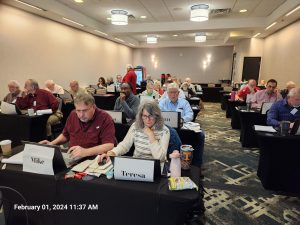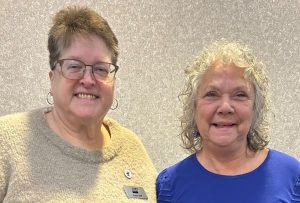By Susan Self and Barbara Martocci
National Emergency Assistance (NEA) offered a 2-week training course on January 22, 2024, in Chattanooga for new employees. The course focused on learning the details of the Federal Emergency Management Agency (FEMA) position of Program Delivery Manager (PDMG). These students will soon represent TVA and NEA when deployed to FEMA-declared disasters within the United States and its territories.
Twenty-nine students attended the two-week long course to learn how the FEMA Public Assistance (PA) process works and what is important in the recovery from disasters for State, Local, Territorial governments, and some private non-profit organizations. The class teaches students how the PA process works, the laws, executive orders, and policies that support the recovery work, and how an applicant (municipality) can apply for reimbursement from FEMA for a portion of the costs incurred while recovering from a disaster.
 Susan Self, NEA Program Manager, arranged the two-week session with the help of Marka Smith, BVI Program Manager. Kathy Black, BVI/NEA/RRC President, was in attendance to welcome the class and encourage their hard work in learning the process. The trainers included Larry Bryant, Jackie Stewart, Larry Wolfe, and Barbara Martocci. All current members of the NEA Board of Directors (John Layne, Wayne Poppe, Tony Giggy, and Tim Cornelius) also showed their support by observing portions of the training and conversing with the students.
Susan Self, NEA Program Manager, arranged the two-week session with the help of Marka Smith, BVI Program Manager. Kathy Black, BVI/NEA/RRC President, was in attendance to welcome the class and encourage their hard work in learning the process. The trainers included Larry Bryant, Jackie Stewart, Larry Wolfe, and Barbara Martocci. All current members of the NEA Board of Directors (John Layne, Wayne Poppe, Tony Giggy, and Tim Cornelius) also showed their support by observing portions of the training and conversing with the students.
FEMA employees from Public Assistance’s Resource Augmentation Section’s (RAS) Field Augmentation Team were on-hand the first and part of the second week to visit the class, meet with instructors and participants, and interact with BVI staff. Christina Zekas and Rafael Aponte-Olmo were available to kick off the two-week program.
Will Melara, RAS Section Chief, stated, “I want to recognize the excellent work and dedication of the instructor team and the organization of the training down to the facilities.” This training represented a joint financial effort from both agencies to ensure NEA’s new employees are mission-ready for the upcoming 2024 hurricane season.
Graduates of the class are now able to deploy when disasters occur and NEA is called upon to help. The training will continue upon deployment with specific tasks and courses geared to show proficiency sufficient to become a fully qualified PDMG. NEA employees are required to deploy at least once a year for a minimum of 120 days, typically.
Future classes to train for the FEMA PDMG position are anticipated for 2025.

